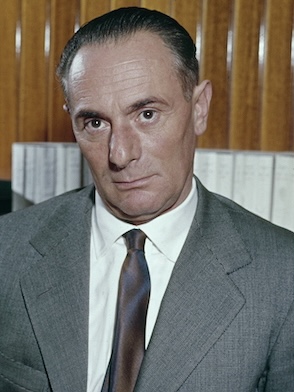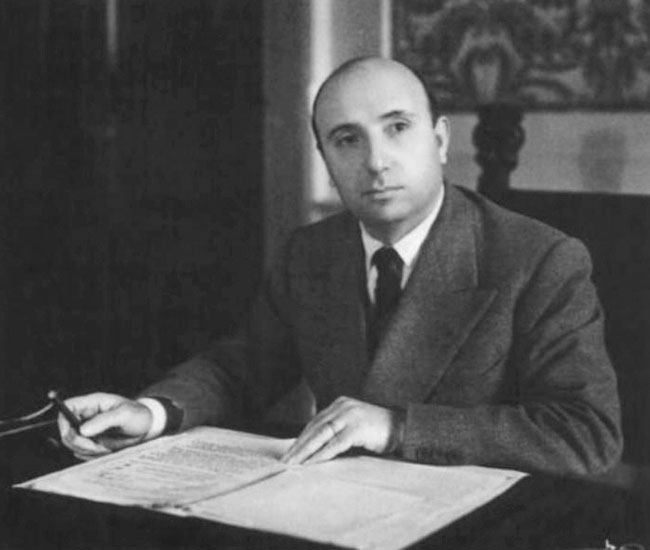|
Pietro Scaglione
Pietro Scaglione (; Lercara Friddi, March 2, 1906 – Palermo, May 5, 1971) was an Italian magistrate and Chief Prosecutor of Palermo, Sicily. He was killed by the Mafia in 1971. Fighting the Mafia Scaglione graduated in law at the University of Palermo in 1927. After a career in the judiciary, he became Chief Prosecutor of Palermo in April 1962.Scaglione, un delitto impunito La Sicilia, July 23, 2006 As such, together with the head of the investigative branch of the prosecution office Cesare Terranova, he was responsible for the repression of the Mafia after the First Mafia war and the |
Pietro Scaglione
Pietro Scaglione (; Lercara Friddi, March 2, 1906 – Palermo, May 5, 1971) was an Italian magistrate and Chief Prosecutor of Palermo, Sicily. He was killed by the Mafia in 1971. Fighting the Mafia Scaglione graduated in law at the University of Palermo in 1927. After a career in the judiciary, he became Chief Prosecutor of Palermo in April 1962.Scaglione, un delitto impunito La Sicilia, July 23, 2006 As such, together with the head of the investigative branch of the prosecution office Cesare Terranova, he was responsible for the repression of the Mafia after the First Mafia war and the |
Giuseppe Calò
Giuseppe "Pippo" Calò (born 30 September 1931) is an Italian mobster and member of the Sicilian Mafia in Porta Nuova. He was referred to as the "''cassiere di Cosa Nostra''" (Mafia's Cashier) because he was heavily involved in the financial side of organized crime, primarily money laundering. He was arrested in 1985 and charged with ordering the murder of Roberto Calvi – nicknamed "''Il banchiere di Dio''" (God's banker) – of the Banco Ambrosiano in 1982, but was acquitted in 2007 due to "insufficient evidence" in a surprise verdict. After Calò was sentenced to 23 years' imprisonment as part of the 1986/87 Maxi Trial, he was sentenced to life imprisonment in 1989 for organising the 1984 Train 904 bombing. He was given several further life sentences between 1995 and 2002. Boss of the Porta Nuova Mafia family Born and raised in Palermo, the capital of Sicily, he was inducted into the Porta Nuova Mafia family at the age of 23 after carrying out a murder to avenge his fathe ... [...More Info...] [...Related Items...] OR: [Wikipedia] [Google] [Baidu] |
Pentito
''Pentito'' (; lit. "repentant"; plural: ''pentiti'') is used colloquially to designate collaborators of justice in Italian criminal procedure terminology who were formerly part of criminal organizations and decided to collaborate with a public prosecutor. The judicial category of ''pentiti'' was originally created in 1970s to combat violence and terrorism during the period of left- and right-wing terrorism known as the Years of Lead. During the 1986–87 Maxi Trial, and after the testimony of Tommaso Buscetta, the term was increasingly applied to former members of organized crime who had abandoned their organization and started helping investigators. Role and benefits In exchange for the information they deliver, ''pentiti'' receive shorter sentences for their crimes, in some cases even freedom. In the Italian judicial system, ''pentiti'' can obtain personal protection, a new name, and some money to start a new life in another place, possibly abroad. This practice is common ... [...More Info...] [...Related Items...] OR: [Wikipedia] [Google] [Baidu] |
Pietro Scaglione - Antonino Lorusso - Lapide Palermo
Pietro is an Italian masculine given name. Notable people with the name include: People * Pietro I Candiano (c. 842–887), briefly the 16th Doge of Venice * Pietro Tribuno (died 912), 17th Doge of Venice, from 887 to his death * Pietro II Candiano (c. 872–939), 19th Doge of Venice, son of Pietro I A–E * Pietro Accolti (1455–1532), Italian Roman Catholic cardinal * Pietro Aldobrandini (1571–1621), Italian cardinal and patron of the arts * Pietro Anastasi (1948–2020), Italian former footballer * Pietro di Antonio Dei, birth name of Bartolomeo della Gatta (1448–1502), Florentine painter, illuminator and architect * Pietro Aretino (1492–1556), Italian author, playwright, poet, satirist and blackmailer * Pietro Auletta (1698–1771), Italian composer known mainly for his operas * Pietro Baracchi (1851–1926), Italian-born astronomer * Pietro Bellotti (1625–1700), Italian Baroque painter * Pietro Belluschi (1899–1994), Italian architect * Pietro Bembo (1470–15 ... [...More Info...] [...Related Items...] OR: [Wikipedia] [Google] [Baidu] |
French Franc
The franc (, ; sign: F or Fr), also commonly distinguished as the (FF), was a currency of France. Between 1360 and 1641, it was the name of coins worth 1 livre tournois and it remained in common parlance as a term for this amount of money. It was reintroduced (in decimal form) in 1795. After two centuries of inflation, it was redenominated in 1960, with each (NF) being worth 100 old francs. The NF designation was continued for a few years before the currency returned to being simply the franc. Many French residents, though, continued to quote prices of especially expensive items in terms of the old franc (equivalent to the new centime), up to and even after the introduction of the euro (for coins and banknotes) in 2002. The French franc was a commonly held international reserve currency of reference in the 19th and 20th centuries. Between 1998 and 2002, the conversion of francs to euros was carried out at a rate of 6.55957 francs to 1 euro. History The French Franc tr ... [...More Info...] [...Related Items...] OR: [Wikipedia] [Google] [Baidu] |
Polizia Di Stato
The ''Polizia di Stato'' (State Police or P.S.) is one of the national police forces of Italy. Alongside the Carabinieri, it is the main police force for providing police duties, primarily to cities and large towns, and with its child agencies it is also responsible for highway patrol (''autostrade''), railways (''ferrovie''), airports (''aeroporti''), customs (together with the ''Guardia di Finanza'') as well as certain waterways, and assisting the local police forces. It was a military force until 1981 when the Italian State Law 121 was passed. This converted the State Police to a civil force, which is in contrast to the other main police forces of Italy: the '' Arma dei Carabinieri'', which is a military police (gendarmerie) force and the ''Guardia di Finanza'', the Italian customs and border protection police that also falls in the military corps category. The ''Polizia di Stato'' is the principal Italian police force for the maintenance of public security and as such it i ... [...More Info...] [...Related Items...] OR: [Wikipedia] [Google] [Baidu] |
Golpe Borghese
The ''Golpe Borghese'' (English: Borghese Coup) was a failed Italian ''coup d'état'' allegedly planned for the night of 7 or 8 December 1970. It was named after Junio Valerio Borghese, wartime commander of the Decima Flottiglia MAS and a hero in the eyes of many post-War Italian fascists. The coup attempt became publicly known when the left-wing journal ''Paese Sera'' ran the headline on the evening of 18 March 1971: ''Subversive plan against the Republic: far-right plot discovered''. The secret operation was code-named Operation Tora Tora after the Japanese attack on Pearl Harbor.Willan, ''Puppetmasters'p. 91/ref> The plan of the coup in its final phase envisaged the involvement of US and NATO warships which were on alert in the Mediterranean Sea. The US Central Intelligence Agency (CIA) reportedly followed the coup, with President Richard Nixon being personally informed of it. Yet in leaked documents, the US ambassador to Rome is quoted saying ''"The last thing we need righ ... [...More Info...] [...Related Items...] OR: [Wikipedia] [Google] [Baidu] |
Enrico Mattei
Enrico Mattei (; 29 April 1906 – 27 October 1962) was an Italian public administrator. After World War II he was given the task of dismantling the Italian petroleum agency Agip, a state enterprise established by the Fascist regime. Instead Mattei enlarged and reorganized it into the National Fuel Trust ( it, Ente Nazionale Idrocarburi, ENI). Under his direction ENI negotiated important oil concessions in the Middle East as well as a significant trade agreement with the Soviet Union, which helped break the oligopoly of the " Seven Sisters" that dominated the mid-20th-century oil industry. He also introduced the principle whereby the country that owned exploited oil reserves received 75% of the profits."Italy: Powerful Man" '' |
Mauro De Mauro
Mauro De Mauro (; 6 September 1921 – disappeared 16 September 1970) was an Italian investigative journalist. Originally a supporter of Benito Mussolini's Fascist regime, De Mauro eventually became a journalist with the left-leaning newspaper ''L'Ora'' in Palermo. He disappeared in September 1970 and his body has never been found. The disappearance and probable death of the "inconvenient journalist" (''giornalista scomodo'') – as he became known as a result of his investigative reporting – remains one of the greatest unsolved mysteries in modern Italian history. Several explanations for De Mauro's disappearance are current. One is related to the death of Enrico Mattei, the president of Italy's state-owned oil and gas conglomerate ENI. Another is that De Mauro had discovered a drug trafficking network between Sicily and the United States. A third explanation links his disappearance with the Golpe Borghese, a 1970 foiled right-wing ''coup d'état''. De Mauro was apparently c ... [...More Info...] [...Related Items...] OR: [Wikipedia] [Google] [Baidu] |
May Day
May Day is a European festival of ancient origins marking the beginning of summer, usually celebrated on 1 May, around halfway between the spring equinox and summer solstice. Festivities may also be held the night before, known as May Eve. Traditions often include gathering wildflowers and green branches, weaving floral garlands, crowning a May Queen (sometimes with a male companion), and setting up a Maypole, May Tree or May Bush, around which people dance. Bonfires are also part of the festival in some regions. Regional varieties and related traditions include Walpurgis Night in central and northern Europe, the Gaelic festival Beltane, the Welsh festival Calan Mai, and May devotions to the Blessed Virgin Mary. It has also been associated with the ancient Roman festival Floralia. In 1889, 1 May was chosen as the date for International Workers' Day by the Second International, to commemorate the Haymarket affair in Chicago and the struggle for an eight-hour working day. ... [...More Info...] [...Related Items...] OR: [Wikipedia] [Google] [Baidu] |
Portella Della Ginestra Massacre
The Portella della Ginestra massacre was one of the most violent acts in the history of modern Italian politics, when 11 people were killed and 27 wounded during May Day celebrations in Sicily on 1 May 1947, in the municipality of Piana degli Albanesi. Those held responsible were the bandit and separatist leader Salvatore Giuliano and his gang, although their motives and intentions are still a matter of controversy. Preceding events From May 1893, during the period of the Fasci Siciliani, the peasants of the neighbouring towns of Piana degli Albanesi, San Giuseppe Jato and San Cipirello used to gather at Portella della Ginestra for the Labour Day celebrations at the initiative of the physician and peasant leader Nicola Barbato, who used to speak to the crowd from a big rock that was later called "Barbato's Stone". The tradition was interrupted during the Fascist period and resumed after the fall of the Fascist regime. [...More Info...] [...Related Items...] OR: [Wikipedia] [Google] [Baidu] |



_by_Antonio_Reyna_Manescau.jpg)
